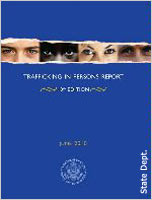
U.S. embassy and consulate websites or www.state.gov.
We’ve gone social!
Follow us on our facebook pages and join the conversation.
22 June 2010
Pakistan’s Efforts on Trafficking Cited by United States
U.S. joins South, Central Asia nations ranked in trafficking report

Washington — Among the countries of the South and Central Asia region, Pakistan stands out in the 2010 Trafficking in Persons Report — for positive reasons.
Pakistan’s ranking as a Tier 2 country in the 2010 Trafficking in Persons (TIP) Report is an improvement over its 2009 rating, when it was listed as a Tier 2 watch list country. The annual report, required by the U.S. Congress, ranks 177 nations by tiers to measure the extent to which each government adheres to the Trafficking Victims Protection Act, a U.S. law enacted in 2000 to combat human trafficking and protect victims. A Tier 2 ranking means a government is “making significant efforts” to comply with the anti-trafficking law’s minimum standards but does not yet meet those standards. Tier 2 watch list countries do not meet the minimum standards but are making significant efforts, yet trafficking is either increasing or more concrete steps are needed by the governments.
For the first time, the 2010 report includes the United States in its rankings, with the U.S. listed as a Tier 1 country, where the government complies fully with the law’s minimum standards.
The U.S. Embassy in Islamabad acknowledged Pakistan’s 2010 ranking in a statement, saying, “The U.S. Government is committed to supporting Pakistan in its efforts to combat human trafficking.” The embassy’s statement added that the 2010 TIP report reflected “the Government of Pakistan’s efforts to prosecute trafficking offenders, prevent and combat bonded labor, and protect trafficking victims.”
Of the 12 South and Central Asia nations ranked in the 2010 report, Pakistan was the only one to improve on its ranking. In 2010, Nepal and Kyrgyzstan are ranked as Tier 2 nations, as they were in 2009. Bangladesh, India, Sri Lanka, Tajikistan, Turkmenistan and Uzbekistan are ranked as Tier 2 watch list, the same as in 2009. Afghanistan, Kazakhstan and the Maldives all ranked on the Tier 2 watch list in 2010, down from their Tier 2 rankings in 2009.
During 2009, Pakistan endeavored to prosecute individuals charged with human trafficking, the TIP report said. According to the report, 385 people were convicted in 2009 under the Prevention and Control of Human Trafficking Ordinance, compared to just 28 in 2008. Another 166 were convicted under various other laws associated with human trafficking, the report said. At least three of those convicted were guilty of child trafficking, with the rest guilty of either labor or sex trafficking. In addition, the report said more than 150 Pakistani officials were penalized for facilitating or “participating in illegal migration and human smuggling.”
“The Government of Pakistan made some progress in its efforts to protect victims of human trafficking,” the report said. During 2009, local police successfully freed more than 2,000 bonded laborers in Sindh province, and Pakistan’s federal government succeeded in providing legal aid and development assistance, including land, housing, money and agricultural assistance, to bonded laborers from the provinces of Khyber-Pakhtunkhwa, Punjab, Balochistan and Sindh. More than 1,000 children who had been trafficked to the United Arab Emirates were also successfully repatriated, the report said.
Pakistan also received mention for its efforts at preventing human trafficking, including the Punjab government’s Elimination of Bonded Labor in Brick Kilns project, which collectively spent millions of dollars to issue Computerized National Identification Cards, provide loans so laborers could get out of debt, and establish schools onsite at brick kilns. Pakistan has also invested in training its police and military officials in the most effective ways to combat human trafficking, the report said.
The State Department also honored nine Heroes in the Fight Against Modern Slavery in 2010, including activists from Uzbekistan, India, Brazil, Burundi, Hungary, Jordan, Mauritania, Mongolia and the United States.
Natalia Abdullayeva of Uzbekistan was honored for forging unprecedented partnerships between the private sector and the government to fight trafficking. India’s Sattaru Umapathi, the anti-human trafficking officer of the Crime Investigation Department for the state of Andhra Pradesh, was honored for leading numerous interstate and intrastate rescue operations, rescuing victims and arresting traffickers.
(This is a product of the Bureau of International Information Programs, U.S. Department of State. Web site: http://www.america.gov)
